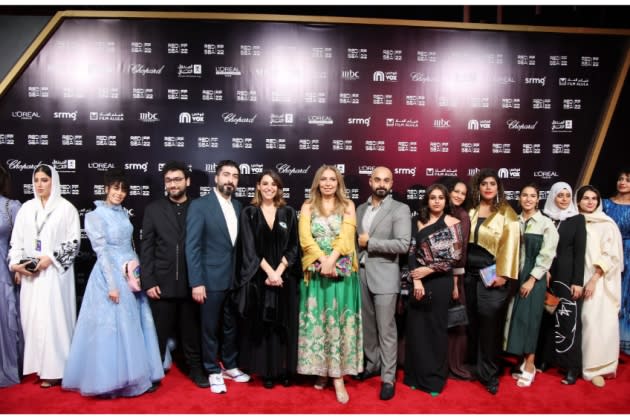Red Sea Lodge Focuses on Local Talent, International Appeal and Gender Equality

Back for its third year, the Red Sea Lodge brought together 11 feature film projects for a 10-month intensive program in cooperation with TorinoFilmLab. This Saturday, the teams pitched their projects at the Red Sea Souk, the Red Sea Film Festival’s market.
The Red Sea Lodge elects projects for creative and professional mentorship, development and industry opportunities. The initiative is focused on Saudi and Arab projects, and is key to the festival’s mission to support and develop emerging local talent. This year, seven Saudi projects are joined by four projects from Algeria, Egypt and Lebanon. They are “Aisha Can’t Fly Away Anymore,” “A Last Argument Against Youth,” “A Quarter to Thursday in Algiers,” “Bubblegum Brigades,” “Dancing on Fire,” “Dogmas,” “Scapegoat,” “Tahweedah,” “The Settlement,” “Yajuj” and “You Were the Poet and I Thought I Existed.”
More from Variety
Alongside script development sessions, the Lodge features a producers’ coaching program and sessions on professional development, production, financing, sales and marketing. Participants also get the chance to work with experienced professionals in all filmmaking capacities. At the end of the initiative, two projects will be awarded the annual Red Sea Lodge production prizes of $100,000 each, plus a grant and an Arab premiere at next year’s Red Sea Film Festival.
Speaking on the program, the executive director of TorinoFilmLab Savina Neirotti, says: “It is a project development course, but it is also a training that allows one to understand the scriptwriting and production processes, what it means to collaborate, how to build a community, confidence, and the strength needed to further your career.”
Building a community is at the core of the Red Sea Lodge, which sees the participating teams form strong relationships throughout their 10 months together. “What I see here is a very intense way of collaboration,” says producer Titus Kreyenberg, one of the Lodge’s mentors. “They are not enemies. This is a team-building exercise, it’s an effort to have them work together and help each other. When you start working as a group and you hear from more experienced people, you realize you’re not alone. If other people have mastered it, so can you.”
Over 50% of Lodge teams are led by women, with the program firmly following a pledge to have an equal gender split within its selection. Women’s rights and female empowerment are a common thread amongst this year’s projects, with titles such as “You Were the Poet and I Thought I Existed” and “Dancing on Fire” building upon generational trauma and learnings to tell female-led stories. “This story is about women’s liberation and passing that liberation from one generation to another,” said the director of “Dancing on Fire,” Hana Alomair, when speaking about the project at the pitching session.
“This was one of the conditions from the very beginning,” continues Kreyenberg, “and it’s amazing, especially from the Saudi side, how confident they are in telling their stories. It’s mostly women telling their stories, the majority of writers and producers are women, and they are dominating the group.”
Another common thread during the pitches at the Red Sea Lodge was a desire to tell local stories with the power to resonate with international audiences. “Scapegoat” producer Razan Alsoghayer remarked she began making films for her family, then evolved to telling stories locally and is now ready to have her voice heard on an international scale. “Yajuj” writer Murad Amayreh reinforced the wide appeal of his story about an ancient virus that turns people into zombies, a project to be directed by Fahmi Farahat, who served as an assistant producer on 2020’s “Bunuwirah,” the first Saudi horror film to be screened in local cinemas.
The atmosphere in the room during the Red Sea Lodge pitching session was of contagious enthusiasm, with roaring applause for the teams onstage and many exchanged celebratory hugs between the participants.
Speaking on his hopes for the future of the initiative following a successful kickstart to the 2022 events, Kreyenberg was categorical: “I came here with hope and a great amount of curiosity, but now I know there’s such a wealth of talent and stories that have been dormant for such a long time. People will tell their stories, they will make their films and they will have something new to say to us in Europe and the rest of the world.”
Neirotti agrees, reinforcing that “we are going back to the old traditions and the oral habits of storytelling. From us from abroad, Saudi was an enigma. There are so many differences, details and nuances and these filmmakers are the ones who need to tell us more about it.”
Best of Variety
Sign up for Variety’s Newsletter. For the latest news, follow us on Facebook, Twitter, and Instagram.

 Yahoo News
Yahoo News 